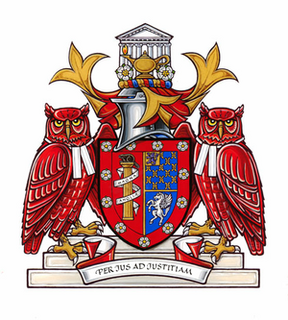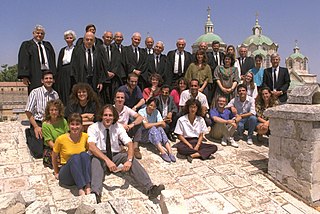Related Research Articles

The Supreme Court of Canada is the highest court in the judicial system of Canada. It comprises nine justices,whose decisions are the ultimate application of Canadian law,and grants permission to between 40 and 75 litigants each year to appeal decisions rendered by provincial,territorial and federal appellate courts. The Supreme Court is bijural,hearing cases from two major legal traditions and bilingual,hearing cases in both official languages of Canada.
In common law systems,a superior court is a court of general competence which typically has unlimited jurisdiction with regard to civil and criminal legal cases. A superior court is "superior" in relation to a court with limited jurisdiction,which is restricted to civil cases involving monetary amounts with a specific limit,or criminal cases involving offenses of a less serious nature. A superior court may hear appeals from lower courts. The highest of the superior courts is the Supreme court.

The Court of Session is the supreme civil court of Scotland and constitutes part of the College of Justice;the supreme criminal court of Scotland is the High Court of Justiciary. The Court of Session sits in Parliament House in Edinburgh and is both a trial court and a court of appeal. Decisions of the court can be appealed to the Supreme Court of the United Kingdom,with the permission of either the Inner House or the Supreme Court. The Court of Session and the local sheriff courts of Scotland have concurrent jurisdiction for all cases with a monetary value in excess of £100,000;the pursuer is given first choice of court. However,the majority of complex,important,or high value cases are brought in the Court of Session. Cases can be remitted to the Court of Session from the sheriff courts,including the Sheriff Personal Injury Court,at the request of the presiding sheriff. Legal aid,administered by the Scottish Legal Aid Board,is available to persons with little disposable income for cases in the Court of Session.

Osgoode Hall Law School,commonly shortened to Osgoode,is the law school of York University in Toronto,Ontario,Canada.
The court system of Canada forms the judicial branch of government,formally known as "The Queen on the Bench",which interprets the law and is made up of many courts differing in levels of legal superiority and separated by jurisdiction. Some of the courts are federal in nature,while others are provincial or territorial.
J.J. Michel Robert,is a Canadian jurist and former politician from Quebec.

A law clerk or a judicial clerk is an individual—generally an attorney—who provides direct assistance and counsel to a judge in making legal determinations and in writing opinions by researching issues before the court. Judicial clerks often play significant roles in the formation of case law through their influence upon judges' decisions. Judicial clerks should not be confused with legal clerks,court clerks,or courtroom deputies who provide secretarial and administrative support to attorneys and/or judges.
Jean Martineau,was a Canadian lawyer,judge and President of the Canada Council for the Arts from 1964 to 1969.
The Court of Appeal for Saskatchewan (SKCA) is a Canadian appellate court.
The Manitoba Court of Appeal is the court of appeal in,and the highest court of,the Canadian province of Manitoba. It hears criminal,civil,and family law cases,as well as appeals from various administrative boards and tribunals.
The Court of Queen's Bench of Manitoba —or the Court of King’s Bench of Manitoba,depending on the monarch—is the superior court of the Canadian province of Manitoba.

The judicial officers of the Republic of Singapore work in the Supreme Court and the State Courts to hear and determine disputes between litigants in civil cases and,in criminal matters,to determine the liability of accused persons and their sentences if they are convicted.
Richard M. Mosk was an associate justice of the California Courts of Appeal,Second District.
Anne L. Mactavish is a Canadian Federal Court trial judge. Born in Montreal,Quebec,Canada,her education was at Bishop's University,University of New Brunswick and University of Ottawa. She was called to the Bar of Ontario in 1982. She became an Associate and Partner at Perley-Robertson,Panet,Hill &McDougall from 1982 to 1996. She was appointed President of the Human Rights Tribunal Panel in 1995,and Chairperson of the Canadian Human Rights Tribunal in 1998. Mactavish was also President of the County of Carleton Law Association.
Marc Nadon LL.L. is a supernumerary judge on the Canadian Federal Court of Appeal. He has practised law in both Quebec and the United Kingdom,focusing on maritime and transportation law. He was also an arbitrator and former lecturer in law at the Universitéde Sherbrooke. Nadon was nominated by Prime Minister Stephen Harper to be a puisne justice of the Supreme Court of Canada in October 2013. Following controversy about the appointment,the federal government referred the constitutionality of the appointment to the Supreme Court of Canada. In their decision in Reference Re Supreme Court Act,ss 5 and 6,the Supreme Court quashed his appointment,concluding he did not meet the eligibility criteria provided in the Supreme Court Act.
Shane Raymond Marshall AM is a former judge of the Federal Court of Australia and a current Acting Judge of the Supreme Court of Tasmania and a Deputy Chairperson of the Victorian Racing Tribunal.
AndréF.J. Scott is a Canadian lawyer. He is a justice with the Federal Court of Appeal. He has previously served as Chief of staff of the Minister of National Defence and of the Minister of Communications.
The prefix The Honourable,abbreviated to The Hon.,Hon.,or The Hon'ble,is an honorific style that is used before the names of certain classes of people.
Section 92(14) of the Constitution Act,1867,also known as the administration of justice power,grants the provincial legislatures of Canada the authority to legislate on:
14. The Administration of Justice in the Province,including the Constitution,Maintenance,and Organization of Provincial Courts,both of Civil and of Criminal Jurisdiction,and including Procedure in Civil Matters in those Courts.
Mahmud Jamal is a Canadian jurist serving as a puisne justice of the Supreme Court of Canada since 2021. Jamal worked as a partner at Osler,Hoskin &Harcourt and taught law at McGill University and Osgoode Hall Law School before he was appointed to the Court of Appeal for Ontario in 2019. He was nominated to the Supreme Court on June 17,2021,taking office on July 1 to succeed Rosalie Abella. Jamal was born in Kenya to a family of South Asian origin,making him the first person from a visible minority group to serve as a justice of the Supreme Court.
References
- ↑ Federal Court of Canada, About the Court Archived 2013-06-12 at the Wayback Machine
- 1 2 3 "The Honourable Luc Martineau". ciaj-icaj.ca. Canadian Institute for the Administration of Justice. Retrieved 18 August 2021.
- 1 2 "The Honourable Luc Martineau". fct-ct.gc.ca. 14 April 2019. Archived from the original on 18 August 2021. Retrieved 18 August 2021.
- 1 2 Carolino, Bernise (19 October 2020). "Justice Luc Martineau is new chair of Copyright Board of Canada". canadianlawyermag. Canadian Lawyer. Retrieved 18 August 2021.
- ↑ "Courts Administration Service Act". Act of 27 March 2002. Parliament of Canada.